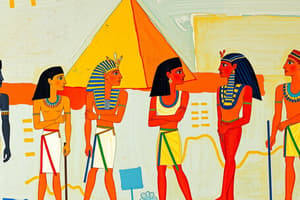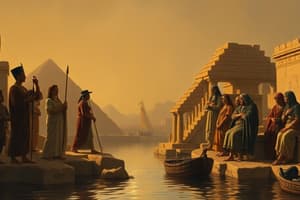Podcast
Questions and Answers
¿Quién ocupaba el puesto más alto en la jerarquía social de Egipto?
¿Quién ocupaba el puesto más alto en la jerarquía social de Egipto?
- Los artesanos
- El faraón (correct)
- Los nobles
- Los escribas
¿Qué roles desempeñaban los nobles y el clero en la antigua sociedad egipcia?
¿Qué roles desempeñaban los nobles y el clero en la antigua sociedad egipcia?
- Sacerdotes y jueces (correct)
- Granjeros y pescadores
- Comerciantes y guerreros
- Escribas y artesanos
¿Qué simbolizaba el faraón al ser representado con una corona sentado en un trono inscrito con el nombre del dios Amón?
¿Qué simbolizaba el faraón al ser representado con una corona sentado en un trono inscrito con el nombre del dios Amón?
- Su poder militar
- Su sabiduría política
- Su estatus divino (correct)
- Su linaje real
¿Qué característica distingue a los escribas y artesanos en la sociedad egipcia antigua?
¿Qué característica distingue a los escribas y artesanos en la sociedad egipcia antigua?
¿Qué posición ocupaban la reina y sus hijos en la jerarquía social de Egipto?
¿Qué posición ocupaban la reina y sus hijos en la jerarquía social de Egipto?
¿Cuál era el papel de los escribas en la sociedad del antiguo Egipto?
¿Cuál era el papel de los escribas en la sociedad del antiguo Egipto?
¿Cuál era la principal tarea de los artesanos en la antigua sociedad egipcia?
¿Cuál era la principal tarea de los artesanos en la antigua sociedad egipcia?
¿Qué porcentaje aproximado de la población eran trabajadores manuales en el antiguo Egipto?
¿Qué porcentaje aproximado de la población eran trabajadores manuales en el antiguo Egipto?
¿Qué función principal tenían los esclavos en la sociedad egipcia antigua?
¿Qué función principal tenían los esclavos en la sociedad egipcia antigua?
¿Qué aspecto de la antigua civilización egipcia continúa influyendo en la sociedad moderna según el texto?
¿Qué aspecto de la antigua civilización egipcia continúa influyendo en la sociedad moderna según el texto?
Flashcards are hidden until you start studying
Study Notes
Ancient Egypt Social Classes and Legacy
Ancient Egypt, one of the earliest civilizations, was known for its highly organized society that thrived along the banks of the Nile River. This civilization lasted for thousands of years and left behind a significant cultural and historical impact. One of the most notable aspects of ancient Egyptian society was its social hierarchy, consisting of different classes, each with distinct roles and responsibilities. These classes played a crucial part in maintaining the stability and prosperity of the society.
Social Classes
Pharaoh and Royal Family
At the top of the social ladder was the pharaoh, considered a god-king who ruled Egypt. The pharaoh was responsible for ensuring the religious and spiritual well-being of his people. He was often depicted wearing the crown and sitting on a throne inscribed with the name of the god Amun, signifying his divine status. The royal family, including the queen and her children, held positions of great power and prestige alongside the pharaoh.
Nobles and Clergy
Below the pharaoh and his immediate family were the nobles and clergy. These individuals held high positions within the administration of the empire, serving as governors, judges, and priests. They often owned large tracts of land and controlled significant resources, making them powerful figures in Egyptian society.
Scribes and Artisans
Scribes and artisans represented another class in ancient Egypt. Scribes, skilled in reading and writing, played a vital role in the government administration, the economy, and the judicial system. They worked as teachers, administrators, and secretaries. Similarly, artisans, including potters, metalworkers, and weavers, created essential items for everyday life, from household goods to clothing.
Farmers and Laborers
Agriculture formed the backbone of the Egyptian economy, and farmers were the foundation of the society. They cultivated crops, raised livestock, and managed irrigation systems. Laborers, mostly peasants, performed manual labor tasks in fields, workshops, and construction projects. Overall, laborers accounted for nearly 90% of the population.
Slaves
Slaves were the lowest class in ancient Egyptian society. They were either prisoners of war or indebted persons who could not pay off their debts. Slaves were used primarily as agricultural laborers, domestic servants, and workers in quarries and mines. Despite being at the bottom of the social hierarchy, slaves still contributed significantly to the overall functioning of the society.
Legacy of Ancient Egypt
Despite the passage of time, the legacy of ancient Egypt continues to influence modern society in various ways. Some of these impacts include:
-
Pyramids: The iconic pyramids of Egypt are a symbol of the civilization's engineering prowess and architectural innovation. They continue to inspire contemporary structures and serve as tourist attractions worldwide.
-
Hieroglyphics: The system of writing using symbols called hieroglyphs remains a fascinating subject of study for scholars and enthusiasts alike. Its influence can be seen in modern calligraphy and typography.
-
Religious Practices: Many aspects of ancient Egyptian religion, such as the concept of gods, rituals, and beliefs, have influenced religions and belief systems across the globe.
-
Language: Modern languages like English contain words derived from ancient Egyptian, indicating the extensive impact of this civilization on human communication.
-
Archeology: Ancient Egypt has been a source of inspiration for numerous generations of archaeologists, anthropologists, and historians seeking to understand human history.
In conclusion, ancient Egypt's social classes shaped the society and allowed it to maintain peace and stability, ultimately leading to the creation of a unique culture. Their legacies, such as monumental architecture, advanced writing techniques, and religious practices, continue to resonate globally, reflecting the enduring significance of this ancient civilization.
Studying That Suits You
Use AI to generate personalized quizzes and flashcards to suit your learning preferences.




